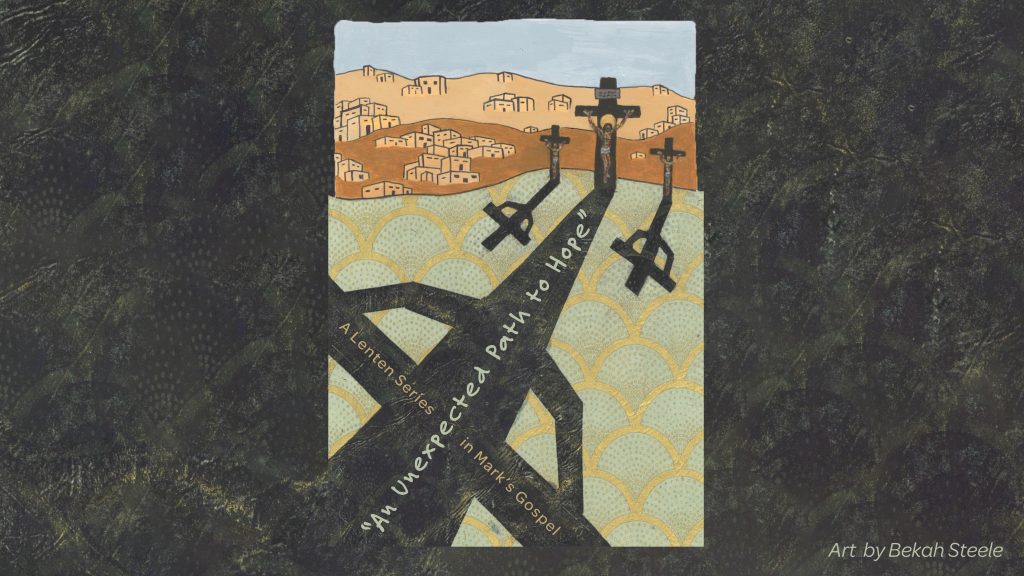Passage: Mark 14:43-50
Guide for Group Discussion or Personal Reflection
Sermon Summary
During his betrayal and arrest, Jesus demonstrated the counterintuitive way in which God’s kingdom advances. Unlike other kingdoms, God’s kingdom comes not through domination, but through surrender.
Though Mark goes to great lengths to highlight Jesus’ authority—an authority he possessed even in the final week of his life—Jesus willingly chose not to exercise his authority, but instead to surrender to his own death by giving himself over to Judas and the betrayers at his arrest. Jesus understood that the only way to win us back into a relationship with God—indeed, for God to eradicate sin without eradicating us—was to choose death. This counterintuitive “left-handed power” is a paradoxical power that looks to the world like weakness. It’s a power that looks like service, looks like giving up rights, and looks like bringing people close into relationship with us, even when we know it will be painful. In the end, though, this is the kind of power that Christians are called to reflect to the world, and the only kind of power that ultimately advances the kingdom.
The reason Jesus could so willingly surrender himself to his captors, however, was because he’d already surrendered to his Father. Though the climax of the passion week was Jesus’ crucifixion and resurrection, the heart of his spiritual struggle was in the Garden of Gethsemane, where he ultimately told his father “not my will but yours be done”. Likewise, we today can only live with “left-handed power” when we first surrender our lives to God, receiving his grace and resting in his plans and purposes for us.
Truly, it’s a counterintuitive kingdom we’re called to represent. Our service often looks like losing when the kingdom is actually advancing…and the power we need to represent that kingdom well is only found in surrendering to the King who first surrendered his life for us.
Sermon Outline
- The Kingdom of God Advances Through Surrender (14:43-50)
- The Kingdom of God is Empowered by Surrender to God (14:32-42)
Group Discussion & Personal Reflection Guide
Re-read the passage (Mark 14:43-50)
The Kingdom of God Advances Through Surrender (14:43-50)
Q) Re-read Mark 14:43-46. What is the significance of Jesus allowing Judas, his betrayer, to kiss him? What does this teach us about Jesus’ mindset at this time?
Q) Re-read Mark 14:43. What does Mark tell us about what kinds of people composed the crowd who came to arrest Jesus? Why is this significant?
Q) In his sermon, Pastor Bobby talked about two different kinds of power—“left-handed power” and “right-handed power”? How would you explain the difference between these two kinds of power? What are some examples of where you see of each kind of power being exercised in our culture today? What kinds of situations specifically call for “left-handed power”?
Q) What might it have looked like for Jesus to exercise “right-handed power” during his arrest? How were his actions an example of “left-handed power?” (i.e. power through surrender) instead?
Q) What would be some characteristics of a whole church who embraced Jesus’ approach to power—i.e. that true power comes through surrender and service?
Q) What is one area or relationship this week where you can take a “left-handed power” approach?
The Kingdom of God is Empowered by Surrender to God (14:32-42)
Q) Re-read Mark 14:32-42, which describes Jesus’ spiritual struggle and ultimate surrender to his Father’s will. How did Jesus’ choice to surrender to God in the Garden of Gethsemane help him to respond to the events that would follow, during his arrest and betrayal?
Q) Pastor Bobby said that we first need to receive Christ’s sacrifice for us before we can reflect him to others as our example. Why do you think that is? What happens in our lives when we try to reflect Christ’s sacrificial love to others without first receiving it and resting in it ourselves?
Additional Application Questions
Q) How else would you like to engage with God this week?
Q) How can you tangibly care for those in your community this week, both inside and outside of the church?
Prayer
Spend time praying for yourselves, our church community, the North Shore community, and our nation and world—particularly those most vulnerable.

